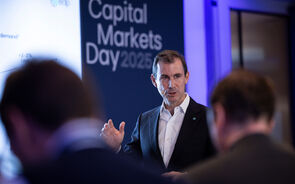Bifes na grelha
1 Mensagem
|Página 1 de 1
Bifes na grelha
Tem havido um silencio de cavalheiros durante a campanha eleitoral, como sempre diz-se o que se quer ouvir e nao o que se pensa. O provavel resultado vai ser um governo de minoria.
Pessoal do forex, apos eleicoes o comportamento da Libra sera' interessante! O que o "The King" disse (ou as palavras que lhe puseram na boca) eu subscrevo por baixo.
Pessoal do forex, apos eleicoes o comportamento da Libra sera' interessante! O que o "The King" disse (ou as palavras que lhe puseram na boca) eu subscrevo por baixo.
Patrick Hosking, Peter Stiff, Richard Partington From The Times April 30, 2010 Escreveu:Austerity Britain will hate its new Government, says King
The Governor of the Bank of England was at the centre of an electoral storm last night after saying that the austerity measures needed to tackle Britain’s budget deficit would be so unpopular that whoever wins next week would not get back into government for a generation.
Mervyn King’s opinion, revealed hours before the prime ministerial debate on the economy, came as a respected think-tank predicted that taxes would have to rise by the equivalent of a 6p-in-the-pound increase in income tax over the next ten years.
The Governor’s prediction was made to the American economist David Hale, who passed on the remarks in an Australian television interview. Mr Hale, who has known Mr King for many years, was commenting on debt levels in major economies when he turned to the British election. “I saw the Governor of the Bank of England last week when I was in London, and he told me whoever wins this election will be out of power for a whole generation because of how tough the fiscal austerity will have to be,” he said.
The Times has also learnt that Mr King gave a further indication of the concerns in Threadneedle Street when he recently told a senior American official that the markets would take a very aggressive view if no credible plan was contained in the Queen’s Speech on May 25.
Analysts have said that without commitment to severe austerity in the first weeks of a new Government, Britain could be heading towards a sterling crisis and a boycott of the gilts market.
The Bank declined to comment on either episode last night, confirming only that Mr King met Mr Hale in a private meeting at the Bank in early March. Mr Hale later apologised for mistaking the date but did not retract the substance of his claim. Mr Hale, who runs a consultancy in Chicago, said a hung parliament would make it harder to introduce necessary austerity measures. “I’d be very bearish right now on both the British pound and on the British government bond market.”
The view was echoed by Kenneth Rogoff, professor of economics at Harvard University and former chief economist at the International Monetary Fund, who told The Times: “The concern from international investors that a new government might not have the strength or commitment to cut the deficit is very great. Not just a coalition — whoever wins.”
Mr King has kept an ultra-low profile during the election, but he has said in the past that budget deficit forecasts for the next few years are “very large” and that the new Government will have to come up with a credible plan.
There is growing concern that none of the main parties has come close to spelling out the scale of the spending cuts and tax increases needed to bring the books closer into balance.
The National Institute for Economic and Social Research said yesterday that whoever was in power by 2015 would have to raise the basic rate of income tax by 6p to reduce the budget deficit down towards 3 per cent.
That would be on top of cutting spending by an extra £30 billion in spending cuts and raising taxes to meet current targets. NIESR thinks the further tightening, in addition to what are expected to be the deepest cuts for half a century, is needed because the Government has been too optimistic about its economic assumptions. Simon Kirby, one of the report’s authors, said: “It will be a shock and very painful for almost everyone.”
NIESR, which advocates a mix of spending cuts and tax rises, said the country needed to move towards repaying debt and getting to a position where it could cope with a potential future crisis, rather than transferring the burden to future generations. It criticised all parties for failing to detail how they would tackle the deficit and said that cutting spending by £6 billion rather than raising National Insurance contributions — an idea floated by the Conservatives — would likely hurt the economy and put 60,000 out of work without making a big difference to debt.
NIESR’s report comes as the GfK NOP Consumer Confidence Index for April dropped by one point to -16 as consumers started to worry more about their personal finances and the wider economic situation.
Não faz mal!...
1 Mensagem
|Página 1 de 1
Quem está ligado:
Utilizadores a ver este Fórum: Artur Jorge, Ferreiratrade, Google [Bot], joao garcao, m-m, Maco, malakas, Mavericks7, MR32, nunorpsilva, O Magriço, PAULOJOAO, SerCyc, TTM62 e 113 visitantes


